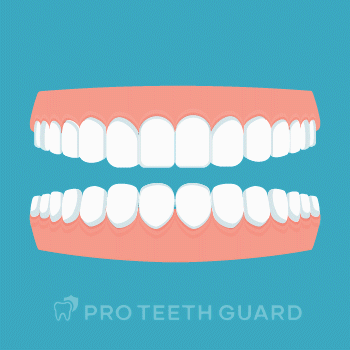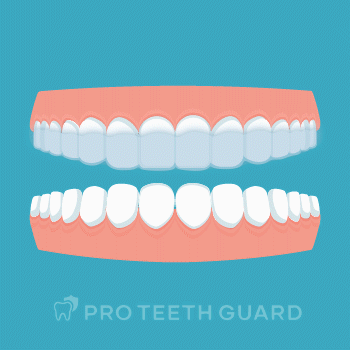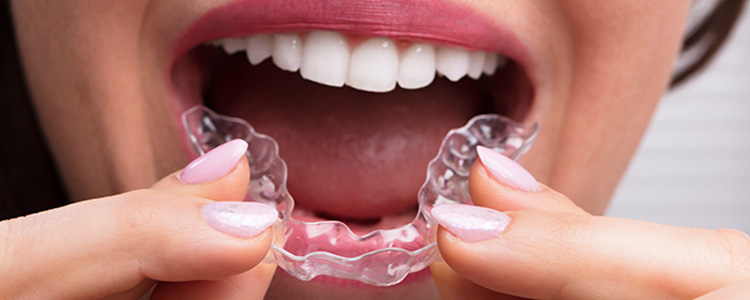A dental mouth guard for sleep is a helpful oral appliance that can protect your teeth and jaw while you sleep. If you’re waking up with headaches, jaw soreness, or facial pain, it might be time to consider purchasing a sleep mouth guard. Alternatively, if your partner complains that you grind your teeth during the night, there’s a high probability you have sleep bruxism.
The sleep mouth guard is the most effective way to prevent teeth grinding and to improve sleep quality and oral health. Though bite mouthguards can’t always get rid of the grinding or stop it completely, they do provide a protective barrier for your teeth to halt any further damage. Grinding wears away the enamel, compromising the physical integrity of your teeth and leading to potential nerve damage (and expensive dentist visits). So, how do you know if you need a mouth guard for sleeping? And which guard is the right fit for you?


Do Mouth Guards Help you Sleep?
Bruxism can keep you up at night and cause you to experience great fatigue and discomfort throughout the day. Mouth guards can encourage restful sleep for the following reasons:
-
Custom mouth guards encourage the jaw to rest in the correct position. This relieves pressure on the overactive jaw muscles.
-
They also prevent you from grinding your teeth, allowing you to fall into a deeper sleep.
-
They open the airway and decrease snoring, promoting an uninterrupted night’s sleep.
Do you Need a Sleep Night Guard?
Mouthguards for sleeping are a highly recommended treatment option for sleep disorders such as bruxism, temporomandibular joint disorder (TMJ/TMD), and sleep apnea. If you suffer from one of these conditions, your dentist has most likely mentioned a night guard as a form of treatment. NHS explains, “Mouth guards and splints even out the pressure across your jaw and create a physical barrier between your upper and lower teeth to protect them from further damage”. A mouth guard for sleeping serves different purposes for each of these conditions, so identifying the root cause of your teeth and jaw pain will be helpful.
Bruxism
Bruxism is a condition involving teeth grinding and clenching. Mouthguards for bruxism provide a necessary layer of protection between the upper and lower teeth. This way, when you go to clench or grind in your sleep, your teeth are unable to make contact with each other. This prevents tooth wear, tooth sensitivity, and other tooth damage from grinding.
TMJ
TMJ is categorized as dysfunction of the temporomandibular joint, or the jaw joint. This disorder is often a progression of bruxism. Some symptoms of TMD include jaw muscle soreness, locking/clicking of the jaw, tooth damage, headaches, and neck and back pain. There are specific mouthguards called occlusal splints available to treat TMJ disorder. These dental appliances settle the jaw into a rested position to release pressure and encourage the muscles to rest throughout the night.
Related Article:
Sleep Apnea
Sleep apnea is a sleep disorder where breathing stops and starts throughout the night. It is usually accompanied by snoring and fatigue from lack of sleep. CPAP machines are one treatment option, but this requires wearing a mask attached to a pump to push air through the relevant passageways. For those with mild symptoms, a mouth guard for sleep apnea offers a less intrusive solution. It opens the airways by positioning the jaw more forward and down. This can help open the airways.

What are the Different Types of Mouthguard for Bruxism?
You should consider the severity of your teeth grinding before selecting a night guard. There are generally 3 different options for varying levels of bruxism: hard, soft, and hybrid.
- Hard night guards are built from plasticized acrylic to endure heavy to severe grinding. They are 1.5 mm thick and can be used for 2-5 years depending on the level of grinding.
- Soft night guards are made from a flexible rubber material and also measure at 1.5 mm thick. The softer material is useful for light to moderate teeth grinders. These typically last anywhere for 6 months to 2 years before replacement.
- Hybrid night guards are made from a dual-laminate material which is soft on the inside and has a hard, rigid exterior. They are typically 2 mm thick. These guards usually need to be replaced after 1-3 years depending on the severity of grinding.
Other factors to consider when purchasing a night guard and a sleep mouth guard include the materials they are made from and the mouth guard price. You want to purchase a night guard which is BPA-free and latex and gluten free.
Related Articles:
Is it Safe to Sleep With a Mouthguard?
In short, yes. The safest mouth guard to sleep with is a custom made guard that is perfectly fitted for your teeth. Custom fit mouth guards are made to fit as comfortably as possible. These will not cause you any damage as you sleep. However, it is not a good idea to wear a cheap, over-the-counter guard each night while you sleep, because they are bulkier and made from less durable materials. This can result in bacteria buildup, discomfort, and potentially a shift in the bite. If a night guard is fitted correctly, it will not cause you harm.
Where can I Buy a Night Guard?
Generally, a mouth guard for sleeping or a night guard can be purchased from one of three places: the dentist, online, or in store. Dentists recommend a custom mouth guard for the treatment of sleep disorders because it is made to fit the individual, so purchasing from an online retailer or the dentist is the best option. Mouthguards purchased from the store are not custom fit and are generally not recommended for grinders.
Night Guards from the Dentist: Night guards can be purchased directly from your dentist. Your dentist will take impressions of your teeth and a custom-fitted night guard will be crafted in a dental lab. A custom night guard from the dentist office can cost between $400 and $800 on average.
Night Guards from an Online Retailer: Custom fitted night guards can also be purchased from an online retailer like Pro Teeth Guard. These dental night guards are effectively the same as the ones purchased directly from the dentist because they are also custom fitted and crafted from the highest quality materials. You will be sent an impression kit to use at home and you will send your impressions to the lab for your custom night guard to be crafted. These mouthguards cost between $100 and $200 on average.
Night Guards from the Store: Over the counter night guards can also be purchased from a drugstore or sports store. However, these guards are not custom fitted to the individual. Rather, they are stock one-size-fits-all guards or boil-and-bite guards often used in contact sports. They are the cheapest option and can be purchased for $15-$30 because they are not made from the quality materials you receive from the dentist or an online retailer. WebMD explains that stock mouthguards are not the best option for treating bruxism: “Little can be done to adjust their fit, they are bulky, make breathing and talking difficult, and they provide little or no protection. Dentists do not recommend their use”.
Tips for Sleeping with a Night Guard
Night guards are a noninvasive treatment option that help many people relieve their painful bruxism and TMD side effects. Sleeping with a dental device, however, may take some adjusting. Here are some tips to help you ease the adjustment process:
- Wear the sleep mouth guard consistently for 4-6 weeks so that it becomes part of your routine. Many wearers find that after this adjustment period, wearing the guard feels like a natural part of their bedtime routine.
- If you find it uncomfortable, wait until just before bed to place the guard in your mouth.
- Be sure to clean your night guard after each use so it stays clean. You can use antibacterial mouthwash, toothbrushes, and fluoride toothpaste to properly clean your guard each night.

Sleep Mouthguards
Mouthguards are a simple solution to a complex problem. Whether you suffer from bruxism, TMJ, sleep apnea, or a combination of the three, wearing a mouth guard for sleeping may be the exact thing you need to avoid upper and lower jaw pain, tooth wear, and other related damage. The best mouth guard for sleep disorders is a custom-fitted mouthguard.
If you believe a custom-fit night guard is the solution for your teeth grinding, check out Pro Teeth Guard. Our dental guards are made from the highest quality materials. We offer a 110% money-back so you can feel completely confident in your purchase.
References:
- Merz, B. (2015). Oral Appliances May Work for Mild but not Severe Sleep Apnea. Harvard Health. https://www.health.harvard.edu/blog/oral-appliances-may-work-for-mild-but-not-severe-sleep-apnea-201506058063
- NHS Writing Staff. (2020). Treatment: Teeth Grinding (Bruxism). NHS. https://www.nhs.uk/conditions/teeth-grinding/treatment/
- WebMD Writing Staff. (2021). Types of Mouth Guards to Protect Your Teeth. WebMD. https://www.webmd.com/oral-health/guide/mouth-guards
